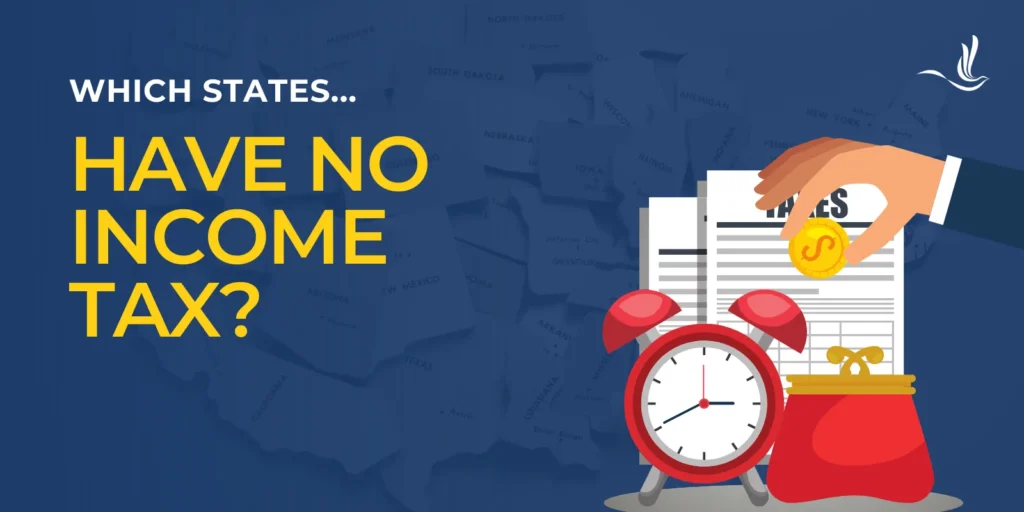As tax season approaches, individuals and businesses alike are often searching for ways to minimize their tax burden. One way some achieve this is by living in a state that does not impose personal income taxes. Currently, nine U.S. states fall into this category, each with its unique approach to taxation. Understanding how these states offset their lack of income tax can provide valuable insights for those considering relocation or financial planning. Here is a summary of which states have no income tax.
Alaska
Alaska has no state income tax and relies heavily on revenue from its vast oil resources. The state has vast oil reserves, particularly on the North Slope, which it leverages for substantial tax revenue. Alaska imposes severance taxes on oil production, which provides a significant portion of the state’s budget. To share oil wealth with residents, Alaska offers the Permanent Fund Dividend (PFD), an annual payment to eligible residents funded by the state’s oil revenues. Alaska has no statewide sales tax, though some localities impose a sales tax. Property taxes are also relatively low compared to other states, and local governments have some autonomy in setting rates.
Florida
Known for its favorable tax climate, Florida does not impose personal income taxes. The state relies on tourism, sales taxes, and other business-related taxes to generate revenue. The state has a 6% statewide sales tax, which is boosted by high tourism activity. Florida’s local governments rely on property taxes for funding. While the state does not have unusually high property taxes, it leans on property tax revenues, especially in areas with high property values. Florida also levies a corporate income tax, which helps balance the revenue lost by not taxing individuals. All of these factors make Florida a popular destination for retirees and business owners alike.
Nevada
With no state income tax, Nevada benefits from a strong tourism industry, particularly from Las Vegas, Reno, and other gambling centers. These generate billions in revenue through taxes on gaming, entertainment, and tourism-related businesses. Nevada has a high sales tax rate, with a statewide base of 6.85%, and local jurisdictions can add additional rates, making the effective sales tax around 8.38% in some areas. Nevada also imposes the Modified Business Tax on wages paid by employers. This is essentially a 1.17% payroll tax that contributes to the state’s general fund.
New Hampshire (Limited)
While New Hampshire does not tax wages, it imposes a 5% tax on interest and dividends (for incomes exceeding a threshold), although this tax is being phased out and will be fully eliminated by 2027. New Hampshire has the fourth-highest property tax rates in the country. Without a state income tax, local governments fund schools and public services through substantial property taxes. Finally, the state imposes a business profits tax and a business enterprise tax, which taxes businesses based on their profits and compensation paid.
South Dakota
South Dakota has no income tax and maintains low taxes across the board. The state relies on its 4.2% statewide sales tax, along with additional local sales taxes, to generate revenue. Many cities and counties impose their own local sales taxes, boosting overall rates to as high as 6.5% in some areas. Tourism is another major revenue generator for South Dakota, particularly around attractions like Mount Rushmore, Badlands National Park, and the Black Hills. With a small population, South Dakota maintains a lower cost structure for providing public services, which also contributes to the state’s ability to function without income taxes.
Tennessee
As of 2021, Tennessee fully eliminated its tax on interest and dividends, making it a no-income-tax state. The state relies on sales tax and business taxes for revenue generation. To help offset this, Tennessee has one of the highest combined state and local sales tax rates in the country, with a statewide rate of 7%, and local jurisdictions can add up to 2.75%. In some areas, the total sales tax rate can be as high as 9.75%. The state also imposes a franchise tax on a business’s net worth or property, as well as an excise tax on corporate income. These taxes generate revenue from businesses operating in the state. Finally, Tennessee also imposes high sin taxes on alcohol, tobacco, and other goods to further supplement its budget.
Texas
Texas is well-known for its lack of state income taxes. It offsets this by having some of the highest property taxes in the country and significant sales tax collections. Texas has a 6.25% base sales tax, and local jurisdictions can add up to 2%, bringing the total rate to 8.25% in many areas. This sales tax applies to most goods and services. Texas also benefits from severance taxes on oil and natural gas production, given the state’s dominance in the energy sector. These taxes provide a significant revenue stream. The state’s large economy, bolstered by industries such as energy, technology, and agriculture, helps to support public services.
Washington
Like other states without income tax, Washington relies on other forms of taxation, such as a high sales tax rate of 6.5%, and local governments can add to that, making the combined sales tax rate over 10% in some areas. Washington also levies a unique business and occupation (B&O) tax. This tax is levied on gross receipts from business activities, rather than profits. Property taxes in Washington contribute to state and local budgets, although they are not as high as those in states like Texas and New Hampshire.
Wyoming
With no personal or corporate income tax, Wyoming relies heavily on taxes from natural resource extraction, particularly coal, oil, and natural gas. Severance taxes on these industries provide significant revenue. Wyoming has a 4% state sales tax, with local governments allowed to add an additional amount. The overall sales tax rate in most places remains relatively low compared to other states. Finally, Wyoming’s small population allows the state to maintain lower overall public spending, which in turn helps it operate without a personal income tax.
Common Themes Across No-Income-Tax States
While these states may not impose income taxes, they often make up for lost revenue with higher property taxes or sales taxes. For example, Texas has one of the highest property tax rates in the country, and Florida, though it lacks an income tax, relies on its high tourism-driven sales tax revenue. States without income taxes tend to attract both individuals and businesses. They offer a compelling environment for entrepreneurs, retirees, and those with significant investment income. While no-income-tax states often appeal to high earners and business owners, other factors like cost of living, property values, and public services should also be considered when evaluating a move. In some cases, higher property taxes or other living expenses might negate some of the savings from not paying state income tax.
Tax Help for Those Who Owe
For those looking to reduce their tax burden, moving to one of the nine states without an income tax can be an attractive option. However, it’s essential to weigh the overall tax structure—including property, sales, and other taxes—when making financial decisions. These states often make up for the lack of income tax in other ways. Understanding how those taxes apply to your situation is key to successful planning. Optima Tax Relief is the nation’s leading tax resolution firm with over $3 billion in resolved tax liabilities.
If You Need Tax Help, Contact Us Today for a Free Consultation
Publisher: Source link











